We should be excited about the UN Security Council Open Debate and High Level Review today to mark the 15th anniversary of the historic Security Council Resolution 1325 on Women Peace and Security. This resolution recognised the impact of war on women and their role in building peace – it made gender a matter of international peace and security.
It seems that the date of this landmark event was changed at a late stage which does not bode well. This disheartening signal of weak intent is compounded by the fact that the Global Study on the implementation of UNSCR 1325 launched yesterday ‘Preventing conflict transforming justice securing the peace’ comes on the back of two other major UN Reviews on peace and security this year – on the UN peacebuilding architecture and UN peace operations. These reviews taken together could have provided the first serious opportunity in decades for the 193 UN Member States to overhaul how we respond to ever-complex threats and realities of international peace and security. And, to put in action the ‘meaningful participation’ of women in defining that agenda and the decisions, operations, aid and actions that dominate their daily lives in conflict zones around the world. There is more than a strong whiff of yet another ‘missed opportunity’.
1325 has become a noun among activists, diplomats and bureaucrats indicating some measure of success in terms of political space. The past 15 years of implementation however, have seen women’s participation in peace and security decisions and actions afflicted by a narrowing of focus by the Security Council on the issue of sexual violence in conflict. Feminist debates on the violence itself get caught up in tensions about defining such conflict-related violence as part of gender based violence more broadly – including forced marriage, domestic violence and trafficking. As Sunila Abeysekera put it in her 2012 article on 50.50, A brutal manifestation of patriarchy,
‘The shift in focus from the vision of women as active agents playing an equal role in mainstream political processes, which was set out in SCR 1325, to a conceptualisation of women primarily as victims of sexual violence in conflict, which is how it is articulated in SCR 1888 and 1889, is perhaps an indication of feminist losses in the first decade of the twenty first century.’
For sure the willingness of the Security Council to only countenance 1325 in action when asked to ‘protect’ women, or ‘protest’ the degradation and military use and abuse of women in war, is a cause for concern. We should not though take away from the power of normative change and greater accountability in naming specific acts of violence against women during conflict as a deliberate strategy and weapon of war. It can no longer be ‘domesticated’ or hidden in the everyday. Unfortunately the issue of sexual violence in conflict has become objectified as the main agenda item for implementing 1325 and the enduring impression is women as victims only. This anniversary gives a platform to reclaim the actions and power of women to positively shape global peace and security in new ways.
As we now take stock of where women are as agents of peace and security, the agenda of countering violent extremism looms large. The current risk is that women will be recast as the victims, mothers and feckless girls who must be part of the de-radicalisation agenda and be the bulwark of countering new forces of extremist groups like ISIS in Syria, Iraq, the UK, France and Australia. Underlying this urge by politicians and securocrats to grasp at single issues is the sense that women’s full agency in peace and security cannot yet be countenanced in practice – roles that range from diplomats, pacifists, mothers, soldiers, activists, bureaucrats, leaders, rebels, doctors, civilians, farmers, teenagers, schoolgirls … And that women continue be at risk of being instrumentalised in the service of other questionable security agendas.
In this confusion we lose sight of the women leaders for peace and in particular the frontline women peacebuilders working for peace in the most difficult circumstances. What does ‘meaningful participation’ look like for these women? We do not lack research; the Global Study confirms that with statistics and trends from UN Women, Christine Bell and others, that participation is progressing but very slowly:
- - Between August 2008 - March 2012 women were signatories in only two out of 61 peace agreements
- - During the period 1990-2010 only 92 of 585 peace agreements contained references to women
- - Of 31 major peace processes between 1992 and 2011, less than 3% of chief mediators and 9% of negotiators were women
Conciliation Resources has long argued and worked for more inclusive peace processes both at the negotiating tables, but also at the community levels where women’s power and work is often rendered invisible and not counted. Our recent applied research on Women Building Peace drew on 9 cases to identify lessons on obstacles to women’s participation and or put on record the positive impact of their ‘meaningful participation’ on the quality of the peace.
The correlation of the quality of peace and the quality of women’s participation is critical - and not simply the numbers of women present. New research led by Thania Paffenholz of the Graduate Institute in Geneva has provided cross-country evidence of this. Women’s presence is also found to enhance likelihood of more space for civil society at the table and makes it more likely that issues of justice will be considered and issues of importance to women (land reform, legal rights, no impunity for human rights abuses including sexual violence in conflict). Informal corridor diplomacy by women has been noted to drive peacemaking when stalemates occur. The cross-community Northern Ireland Women’s Coalition played a range of such roles that led to the signing of the Belfast Agreement in 1998.
It remains the case that counting women in helps. Normative pressure and quotas can create the space for women where institutional resistance is high. Afghanistan and Nepal have recently worked with 30% quotas for parliamentary seats for women in post-conflict elections as we in the UK record a highline of 29% of seats for women in the 2015 elections. Institutional resistance to change remains a major challenge in the corridors of formal diplomacy and talks where often it is the ‘men with guns’ who still get pride of place leaving little space for civil society and people affected by war to have their part in the political settlement that emerges. I once heard a Somali woman speak at a meeting and say ‘when the women come to the table, the table moves to the corridor’!
Frontline women peacebuilders in the Philippines and Colombia show us ways and means of ‘meaningful participation’.
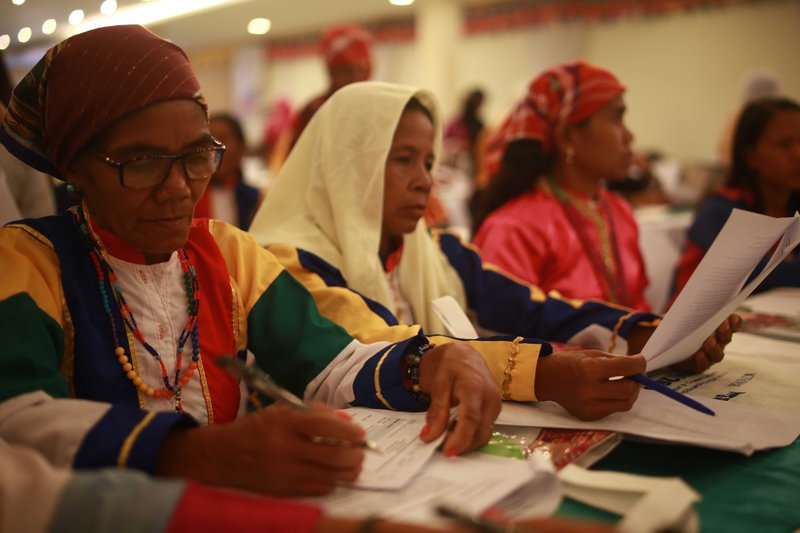
Indigenous women at the Bangsamoro Women's Summit, Catabato City, Mindanao, March 2014. Photo: Irene de la Torre
A historic Comprehensive Peace Agreement between the Moro Islamic Liberation Front (MILF) and the Government of the Philippines was signed in 2014. This followed over 40 years of conflict in Mindanao and 17 years of peace negotiations brokered by Malaysia and supported by an International Contact Group (ICG) made up of 4 states and 4 international NGOs. A new self-governing region called the Bangsamoro will be created where Muslim, Christian and Indigenous women have been mobilising to have their role as citizens in the new laws and institutions being developed.
As one of the 4 NGOs, Conciliation Resources used its role in the ICG (including a strong male feminist lead and the only regular female delegate) supporting the mediator and the talks process for women to be more actively involved as negotiators and advisers. The Government already had a strong presence of women in their delegation, and eventually Miriam Coronel-Ferrer became the first-ever female Chairperson of a peace negotiation panel globally. Over time MILF overcame its initial reluctance and invited women into its delegation as key legal and technical advisers. Both at the level of local peacebuilding in Bangsamoro and at the official table, challenging stereotypes of women’s political roles and forms of participation was key. Evidence from Somalia, Kenya, Sudan and Bangladesh was used to demonstrate how Muslim women had played a role in peace processes and lobbied for change. Space was opened up for civil society concerns and building on the local actions of women working across communities. As a result the Framework Agreement on the Bangsamoro (2012) included a commitment to enhance women’s “meaningful participation” in the Bangsamoro. This provision then gave political space for local women’s organisations to join efforts to influence the agreement implementation phase – organisations like Nisa Ul-Haqq fi Bangsamoro, Teduray Lambangian Women’s Organisation Inc., and the United Youth of the Philippines Women. A Women’s Summit was organised in March 2014 titled ‘Women’s Contributions for a Better Bangsamoro for All’ where the results of 72 consultations with 2,750 women were shared and validated. Women made specific recommendations on security, livelihoods, and women’s participation in political decision-making. Building lasting peace in Mindanao must and will address the empowerment of women as necessary to transformative peace for all.
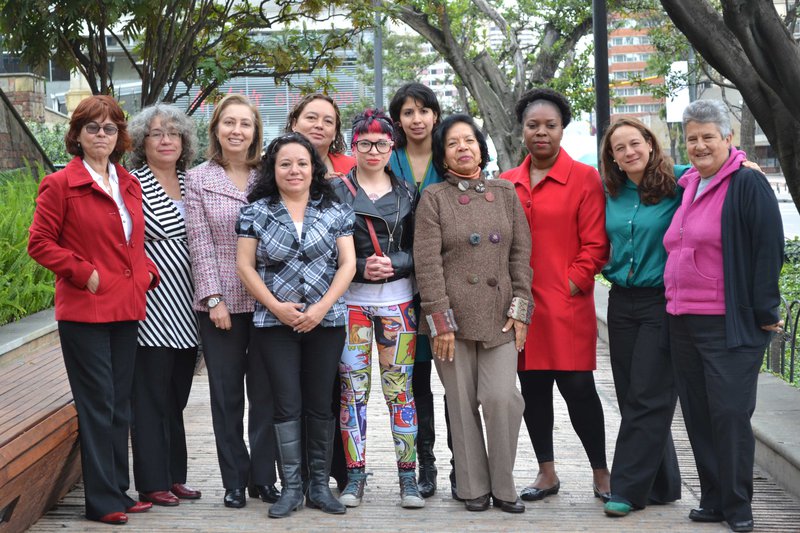
The Women Peace and Security Collective for Reflection and Action (WPS) Colombia. Photo: WPS
Colombia is the most credible peace process observable in action at the moment. Following over 50 years of protracted and bloody conflict, the latest round of peace talks began in 2012 in Havana between the Government of Colombia and the Revolutionary Armed Forces of Colombia (FARC). Women’s organisations have formed a permanent Women’s Summit to lobby for women’s full participation and, more specifically, to formulate policy recommendations on the different agenda items that are being discussed at the negotiating table. In response to local women’s advocacy both peace panels now include women. They have further agreed to create a Gender Sub-Commission that is charged to ensure all agreements and provisions are gender-sensitive and gender-responsive. The Gender Sub-Commission has arranged for several delegations of women to meet directly with the peace negotiators in Havana.
Women are also extremely active outside the formal peace negotiations. Rosa Emilia Salamanca is the Executive Director of CIASE, a feminist organisation working for human rights and peace. She is also the lead convenor of the Women Peace and Security Collective which four years ago became the first permanent safe arena for dialogue among women from civil society, government, ex-combatants, media, academia, and from the business, religious organisations and the security sector. That dialogue led the group to produce an Ethical Pact for a Country in Peace in 2013 which is a call to action on an agenda for building the real peace alongside any agreement that may be signed – the peacebuilding and process that requires the people and society to come together and address the legacies of violence, injustice and trauma in a bid to support real reconciliation, rehabilitation and lasting peace that addresses serious ruptures and divisions. The pact is gaining thousands of signatures, and has highlighted the importance of multiple paths to peace beyond the negotiating table. It is bold and daring in calling for collective and individual responsibility for making peace. The latest development is the establishment, last September, of the first ever dialogue platform between civil society and the army, again spearheaded by women from both civil society and the security sector.
All those who work for peace need to continue making women visible as part of the power analysis at the heart of conflict situations and the peace processes to end them. Only a gender just peace will produce sustainable peace.
Where are the women in political decision-making?
Are international aid and peacebuilding programmes (cross-community dialogue, support to peace talks, economic projects aimed to act as ‘peace dividends’, security sector reform of armed forces or demobilising armed groups etc.) empowering women to ensure that peace is transformative?
These programmes often are poorly planned with no sense of inclusion: where are women are in these processes? As a result the quality of the peace we are aiming for is fundamentally flawed as women are once again left behind as the new institutions and economy come to bear a strong resemblance to the pre-war situation. And so it has been through the 20th and 21st century in all wars.
So, let’s celebrate and reclaim 1325 as we recall great dates, struggles and campaigns to secure the vote for women, election to parliaments, securing women’s rights as human rights – these victories are not events – they are milestones for continued work. So this week we are reminded of the plight of women, men and children in Syria, Iraq, Ukraine, Central African Republic and many other places. We, the international community, should also recognise and support all those women who are fighting for peace, promoting political solutions and seeking to transform their lives and their communities through humanity and peace. Their participation and leadership has to be recognised, nurtured, supported and given proper political value and power both on the frontline and at the tables where eventually deals and agreements will have to be struck. We have to realise too that women are working for peace and gender justice in the most dangerous and unpredictable circumstances far from the Security Council chamber where the international community needs to show more than commitment and agree meaningful actions for women, peace and security.
Read our series of in-depth articles on UN SCR 1325- fifteen years on
Read more
Get our weekly email
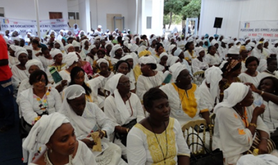
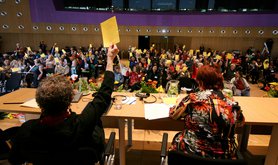
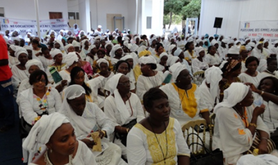

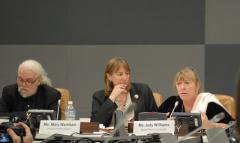

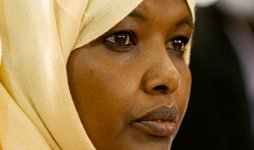
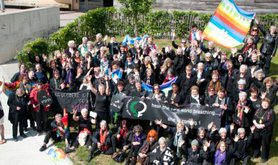
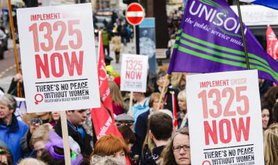
Comments
We encourage anyone to comment, please consult the oD commenting guidelines if you have any questions.